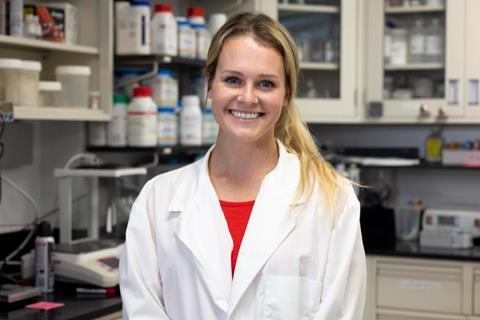It’s commonly known in the cattle industry that bovine respiratory disease is the most costly illness affecting cattle in North America.
Despite extensive research and treatment efforts over the years, it continues to lead to high rates of sickness and death among livestock, according to Samantha Howe, a post-doctoral fellow for the Arkansas Agricultural Experiment Station in the animal science department. The experiment station is the research arm of the University of Arkansas System Division of Agriculture.

Howe received a two-year, $225,000 U.S. Department of Agriculture National Institute of Food and Agriculture grant to explore the use of probiotics in bovine respiratory disease prevention.
Respiratory disease
Howe said bovine respiratory disease is estimated to be responsible for about 70 to 80 percent of feedlot illnesses, and between 40 and 50 percent of all feedlot deaths, and that those numbers have not declined in the last 45 years.
Howe’s research project aims to develop probiotics derived from healthy cattle to prevent bovine respiratory disease.
“By exploring the natural microbial defenses of cattle, this study will investigate the potential of probiotics to offer new, effective solutions to longstanding problems in animal health,” Howe said. “This would benefit cattle producers by increasing the profitability and sustainability of their operations while also ensuring a safer food supply for consumers.”
The research will focus on increasing cattle health and making them less prone to the disease with a microbiome-based therapeutic, or a probiotic, to decrease antimicrobial resistance. Howe expects that these probiotics will decrease the growth of opportunistic pathogens.
Common culprit in BRD
A common culprit in bovine respiratory disease is the bacterium Mannheimia haemolytica, which causes severe infections in the lungs of cattle. Although meat quality or safety is not compromised, cattle suffer from respiratory symptoms, have a fever and lose appetite so they do not gain weight properly.
“We have multiple causative events, but a bacterial opportunistic pathogen is present in most cases,” Howe said.
READ MORE: Could manure and compost act like probiotics, reducing antibiotic resistance in urban soils?
READ MORE: Probiotic feed additive boosts growth and health in poultry in place of antibiotics
Traditional methods to combat bovine respiratory disease have had limited success, Howe said, and the rise of antibiotic-resistant strains of M. haemolytica makes finding new solutions even more urgent.
“There’s an increased risk of antimicrobial resistance and increased consumer pressure to have an all-natural treatment method, so this research hopes to satisfy both,” she said.
Innovative research on probiotics
Probiotics are beneficial bacteria that can help maintain a healthy balance of microbes in the body. The respiratory systems of healthy calves contain different bacteria than those suffering from bovine respiratory disease. Among these beneficial bacteria are species of Corynebacterium, which may help protect cattle from harmful pathogens like M. haemolytica.
Howe says her team’s preliminary studies have shown that these Corynebacterium strains can inhibit the growth of M. haemolytica in lab conditions. She said this is likely due to secondary metabolites — compounds produced by the bacteria that can affect other microbes. Howe’s research seeks to understand how these metabolites work and to explore other potential benefits of these probiotic bacteria.
Howe will investigate how Corynebacterium strains could inhibit the growth of M. haemolytica in the lab. The research will also determine if the strains can colonize the respiratory tract, influence the immune system and prevent M. haemolytica from causing disease in cattle.
Team effort
“I’m very passionate about my work, and it’s nice to know that other people see its value,” Howe said. “But I could not have done it without my adviser, Dr. Jiangchao Zhao, who taught me everything I know, and the people on my team who have helped.”
Zhao was a researcher for the experiment station and a professor in the animal science department when this grant was awarded. He has worked to prevent and mitigate bovine respiratory disease since 2015 and developed nasal microbiome biomarkers to help predict the onset of bovine respiratory disease in cattle.
“The development of nasal microbiome biomarkers has provided us with valuable insights into early detection, but there is still much to be done to mitigate its impact,” Zhao said. “Samantha’s research into probiotics is a promising avenue that could transform our approach to disease prevention by harnessing the natural defenses of cattle, ultimately leading to healthier herds and more sustainable practices in animal agriculture.”
Howe also credited animal science professors and experiment station researchers Beth Kegley and Jeremy Powell, for their mentorship and support.
This grant is part of the Agriculture and Food Research Initiative from USDA-NIFA. The project award no. is 2024-67012-42409.
Topics
- Agriculture
- Bacteria
- Beth Kegley
- bovine respiratory disease
- Corynebacterium
- Healthy Land
- Infection Prevention & Control
- Infectious Disease
- Jeremy Powell
- Jiangchao Zhao
- Mannheimia haemolytica
- People News
- Probiotics, Prebiotics & Synbiotics
- Samantha Howe
- University of Arkansas
- USA & Canada
- Veterinary Medicine & Zoonoses







No comments yet